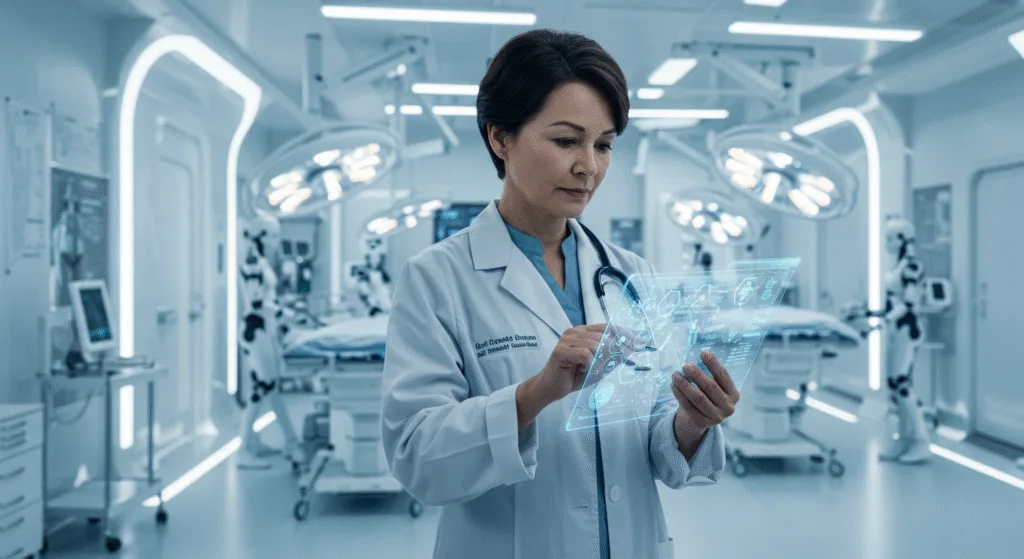Explore the latest AI and machine learning applications across industries. Discover how these technologies are shaping healthcare, finance, marketing, and more.
Introduction: AI and Machine Learning Applications in 2025
Artificial intelligence (AI) and machine learning (ML) have become integral to modern technological advancement. These technologies are being applied across a wide range of industries, from healthcare to finance, transforming how businesses operate and how consumers interact with digital services.
AI is no longer just a concept of science fiction; it’s actively used in everyday life through voice assistants, recommendation engines, fraud detection systems, and autonomous vehicles. In this article, we will explore the most impactful applications of AI and ML, focusing on real-world implementations and future trends.

Healthcare: Revolutionizing Patient Care
One of the most promising areas where AI and ML are being utilized is healthcare. Medical diagnostics powered by deep learning models can detect diseases such as cancer earlier and more accurately than traditional methods.
For example, Google Health has developed an AI system that can detect breast cancer in mammograms with higher accuracy than radiologists. Similarly, IBM Watson Health uses natural language processing to assist doctors in diagnosing rare conditions by analyzing vast amounts of medical literature.
Finance: Enhancing Risk Management and Fraud Detection
In the financial sector, AI and ML are used to improve risk assessment, automate trading, and detect fraudulent transactions. Banks and fintech companies use predictive analytics to assess creditworthiness and prevent loan defaults.
Machine learning algorithms can analyze millions of transactions in real-time to flag suspicious activity. PayPal, for instance, leverages AI to monitor user behavior and identify potential fraud before it occurs.
Marketing: Personalization at Scale
Marketing has been transformed by AI-powered tools that enable hyper-personalized campaigns. Customer segmentation, content creation, and ad targeting are now largely automated using machine learning models.
Tools like HubSpot and Salesforce Einstein use AI to analyze customer data and predict purchasing behavior. Chatbots and virtual assistants are also widely used to provide 24/7 customer support and enhance engagement.
Transportation: Autonomous Vehicles and Traffic Optimization
Self-driving cars rely heavily on AI and ML to process sensor data and make split-second decisions. Companies like Tesla, Waymo, and Uber are investing heavily in autonomous vehicle technology.
Beyond cars, AI is also being used to optimize traffic flow in smart cities. Real-time traffic prediction systems help reduce congestion and improve urban mobility.
Retail: Smarter Shopping Experiences
Retailers are using AI to create seamless shopping experiences both online and offline. From personalized product recommendations to inventory management, AI helps streamline operations and boost sales.
Amazon Go stores use computer vision and machine learning to enable checkout-free shopping. Online, platforms like Shopify integrate AI to suggest products based on browsing history and purchase behavior.
Manufacturing: Predictive Maintenance and Quality Control
In manufacturing, AI and ML are used to predict equipment failures before they occur. Sensors embedded in machinery collect data that is analyzed by ML models to schedule maintenance proactively.
This approach reduces downtime and increases operational efficiency. Companies like Siemens and GE have deployed AI-based solutions to monitor industrial assets and ensure product quality.
Education: Adaptive Learning Systems
AI is reshaping education through adaptive learning platforms that personalize instruction based on student performance. Tools like Duolingo and Khan Academy use machine learning to tailor lessons to individual learning styles.
These systems track progress, identify knowledge gaps, and adjust difficulty levels dynamically, making learning more efficient and engaging.
Conclusion: The Future Is Intelligent
The integration of AI and machine learning into various sectors is not only enhancing productivity but also creating new opportunities for innovation. As data becomes more abundant and computational power increases, the capabilities of AI will continue to expand.
Businesses that adopt AI and ML early are likely to gain a competitive edge. Whether it’s improving customer experience, optimizing internal processes, or driving research and development, artificial intelligence is set to redefine the way we live and work.
Related Links:
- Cognitive computing
- Neural networks
- Natural language processing
- Predictive modeling
- Data-driven decision-making
- Computer vision
- Robotic process automation
- Deep neural networks
- Reinforcement learning
- Edge AI
Read Another Article: How to Choose the Right AI Agent for Your Business
